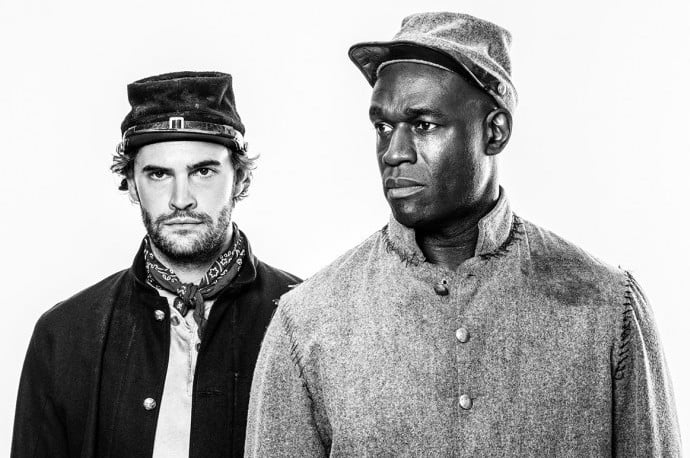
When Stephen Bargonetti, the musical director & performer of Suzan-Lori Parks’s Father Comes Home from the Wars, started playing AC/DC riffs on a semi-acoustic guitar as a prelude to a piece set during the American Civil War, my mind jumped almost immediately to anachronism. There is a beguilingly mongrel strain of anachronism in Western theatre—the clock in Julius Caesar is a famous example—and Parks’s text and Jo Bonney’s production derive a lot of energy from the disruptive associations of times and places. This is partly born out of deep social and cultural sensitivities, and the play is from one perspective a highly intelligent engagement with Ancient Greek and Shakespearean conventions and influences. For example, like the Greek Tragic cycles, the play is in three parts, with frequent nods to Aristotelian unity, while Hero’s (Stephen Toussaint) eloquent indecision & the older characters’ dependence on willing service recall Hamlet and Lear respectively.
Like much black and postcolonial literature, however, this is loaded with an awareness of Eurocentric, Imperialist intellectual violence. The slaves all have Classical names—Hero, Homer (Jimmy Akingbola), Penny—a play on Penelope (Nadine Marshall). But these were chosen not (for the sake of fiction) by the playwright, but by their Master (John Stahl). Any attempt to interpret puns and allusions to the white Western tradition—Hero being forced by his Master to cut off Homer’s ‘foot’, for instance—thus becomes extremely complicated.
What makes these allusions so powerful, however, is not primarily their wit or sophistication, but the way they are born from a profound sense of matter. Parks subverts the Classics to force us imaginatively and emotionally to confront the monopoly on identity enjoyed by the oppressors over their oppressed. A Classical or literary name locks a character in a kind of determinism—Parks’s personae, like those of Shakespeare and Aeschylus, are obsessed with omens and portents—and the Colonel’s rebranding of his property is a statement of ownership to complement the physical signifiers and mutilations he places on their bodies. Smith (Tom Bateman), the white-passing ex-slave captured by the Colonel in Part Two, asks Hero what he would call himself if he could choose his own name: Hero can’t think of one. ‘Both of us. Satisfied with the names they gave. Huh. This world is such a mess,’ replies Smith.
I am unsure, in the final count, whether these points of interests are strengths or weaknesses. In large part, this is due to my position as a white reviewer of a play whose functioning is inextricably bound up with ongoing black oppression. At times, Father Comes Home feels like it has an abundance of ideas which are not as developed or unified as they could be, but this could be a sign of my own inadequate equipment rather than a failing on the part of the text. There’s also a chance that Bonney’s production misses its cues in working towards an inappropriate kind of coherence. Parks structures the play as a series of unique dramatic moments, in keeping with its Greek and Shakespearean influences, but Bonney’s sympathies may have been differently placed, making the drama feel diffuse and unfocuses. What is most encouraging about Parks’s play, however, is the way it attempts to tell a story not in, but through, the theatre, recognising how moral, social, and emotional narratives are inextricable from the dramatist’s toolbox. The play, as with all right spirited drama, is the thing.

Comments